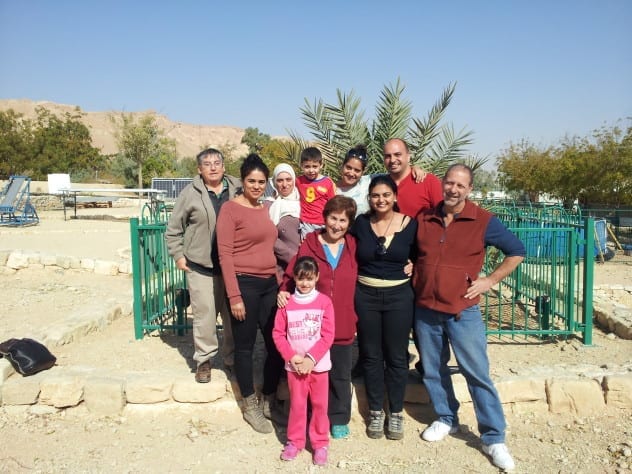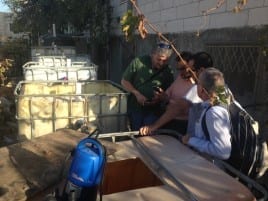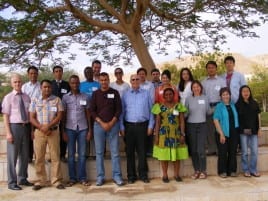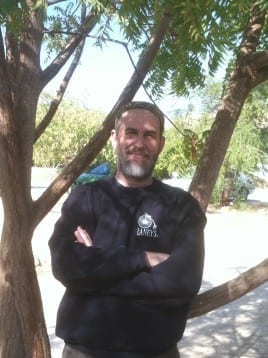Goodbye 2013 Hello 2014
2013 has been an eventful year. The first full semester in our new dorms, two MASHAV programs, the second largest Israel Ride in the history of the ride, the establishment of the Public Council for the Arava Institute in Israel, the arrival of a visiting scholar, Dr. Aaron Frank and his family, the implementation of the Besor River Project, the installation of grey-water systems through out the Middle East, a visit from Teresa Heinz Kerry to our YEEPI program between Lod and Holon and the list goes on. All of this is only possible due to the phenomenal support that the Arava Institute receives from our friends around the world and especially the Friends of the Arava Institute in the US now joined by our Public Council members here in Israel. A special thanks also goes to our friends at the JNF USA who provide us with generous designated grants. As Director of the Arava Institute there is a lot to be proud of but the most of all I am proud of our alumni. What we do at the institute is important but nothing is as important as what our alumni are doing bringing the message that Nature Knows No Borders to their homes throughout the Middle East and throughout the world. Only a few days ago I was privileged to spend some time with the Arava Alumni Peace and Environmental Network (AAPEN) 2014 Conference Planning Committee which had decided to meet at the institute. As we sat around the table with alumni representing a broad spectrum of years at the institute I was overwhelmed by their commitment to the vision of a sustainable and peaceful Middle East no matter how long ago it had been since they had been students here. I look forward to the 2014 Alumni Conference whose theme will center around social and business entrepreneurship in order to help our alumni scale up their dreams. If those responsible for negotiating peace between the Israelis and the Palestinians, could just learn a little from our alumni, I am sure that 2014 will truly be a turning point for people in this region and for the world.
Dr. Elaine Solowey, Dima Halawani 2003-2004, Mahmud, Dima’s son, Ayala Wise 2002-2003, Suleiman Halasah 2006-2007
Zobida Ezery 2012-2013, Reem, Dima’s daugther, Abby Lutman, Manar Saria 2009-2010 and David Lehrer
Methusaleh in the background
Mitigating Trans-boundary Wastewater Contamination
The Center for Trans-boundary Water Management (CTWM) has recently completed the construction of a grey-water (waste water from kitchens and showers) recycling system in the Palestinian town of Halhul, funded by U.S Agency for International Development (USAID) office of Conflict Management and Mitigation. This system is built in a 7-person household, which generates an average monthly salary of 2,000 NIS ($570). In summer months, the water bill for this family can exceed 225 shekels, accounting for over 11% of their monthly income. The grey-water system in Halhul treats approximately 10 m3/month of grey-water, saving the family 70 NIS per month. This saving reduces the percent of household income spent on water by 3.5% and provides the family with clean water for irrigation and crop production. This system is one of six systems funded by USAID. The first such system was built in the Israeli-Arab town of Sachnin and the third system is now being built in a village near Nablus in the West Bank.
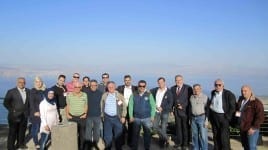
Arava Institute hosts MASHAV, December 2- 17, 2013
Twice a year, the Arava Center for Sustainable Development, directed by Dr. Shmuel Brenner, runs a training course for professionals from developing countries, sponsored by the Israeli Foreign Ministry. Our December course was entitled “Management and Use of Marginal Water Resources for Agricultural and Domestic Use.” Nineteen participants arrived from eleven countries: Thailand, China, Kosovo, Azerbaijan, Colombia, Guyana, Ghana, Cameroon, Myanmar, Nepal, and Serbia. Their professions included employees from government ministries, non-profit organizations and academics. Dr. Clive Lipchin and Dr. Elaine Solowey were the lead lecturers for the course, along with other lecturers from the region and outside the region. The next MASHAV course is scheduled for May and will focus on renewable energy. Submitted by Abby Lutman, Research Programs Coordinator and Grant Writer and Tali Adini, Director of Eco-Paths
Watch Dr. Clive Lipchin’s Mashav presentation on pipeline agreement: About the Pipeline Agreement- Dr. Clive Lipchin
Cross Boundary Cooperation on Water and Tourism
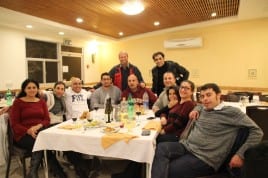
The Cross Boundary Cooperation on Water and Tourism Conference took place at Kibbutz Ein Gedi from December 11- 12. It was a unique meeting between researchers, students, Arava Institute alumni and decision makers from Israel, Jordan, Palestine, United states and Europe. The sessions highlighted existing challenges and opportunities for cross boundary cooperation of specific case studies and topics of research related to water, tourism and environmental protection. Various connections were created during the conference, including friendships, ideas for future projects and cooperation. The Dead Sea and Arava Science Center managed the conference in cooperation with Tamar regional council and other partners. Other workshops will be held to promote the well being of communities and the environment while considering the cross boundary sensitivities. Through the generous support of the Ministry of Regional Cooperation and the Dead Sea Drainage Authority the conference was a success. Submitted by Rina Kedem
Rabbi Michael Visits the Arava Institute
I am back at the Arava Institute for three weeks working on developing institutional cooperation between the Arava Institute and Bennington College, where I am employed part-time. A good part of my trip was spent meeting with the Arava Institute’s alumni in Israel, Palestine and Jordan. It has been an uplifting experience to see all of them and to hear of their important and varied environmental ideas for the region. I have also taught in Rina Kedem’s Environmental Leadership class. It is always a joy for me to teach our students here at the Institute. Having been part of the Arava Institute since it’s door opened in the Fall of 1996 it is heartening to see the continued growth and impact of our students and alumni. The Arava Institute continues to be a cross-border portal for the sharing of environmental ideas within the context of modeling what cooperation can look like in this region. Submitted by Rabbi Michael Cohen, Director of Strategic Partnerships, Friends of the Arava Institute

This past month, the Arava Institute hosted the U.S State Department sponsored Fulbright Specialist, Jennifer Schwab. During her time at the Arava Institute, Jennifer taught the MASHAV course, sponsored by the Israeli Ministry of Foreign Affairs. She taught a course in ‘The economics of implementing small scale domestic water/ waste solutions appropriate for impoverished villages or camps in the developing world.’ As the Co-Founder and Chief Sustainability Officer at the Sierra Club Green Home, Jennifer appeared on ABC’s Good Morning America and was written about in the Wall Street Journal. Jennifer recently sold her company, Sierra Club Green Home (SCGH) and will return to the U.S to continue to manage another company, Green Leader, which she founded last year. Green Leader teaches managers and fortune 500 companies about the principles of sustainability. Jennifer is a regular columnist in the Huffington Post and Inner Green. Submitted by Yelena Galperina

